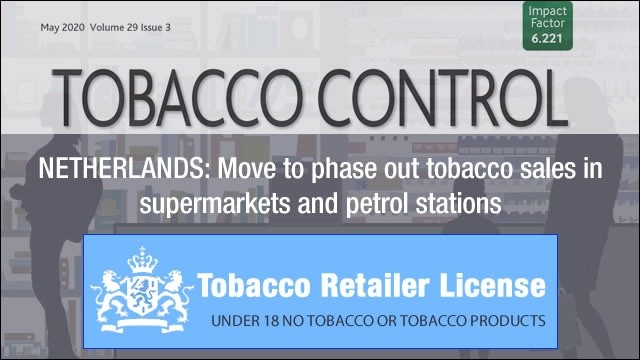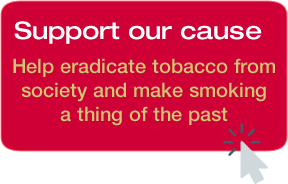Tobacco Control reports on breakthrough in Dutch tobacco control policy
25 April 2020

Tobacco Control, the leading medical scientific journal on tobacco control policies, reports in its May issue on Dutch parliament’s decision to remove tobacco from supermarkets and petrol stations.
Tobacco Control, a publication of the British Medical Journal, published in its May issue (Tobacco Control, volume 29-3) a news story on the Dutch parliament’s decision to end tobacco sales through supermarkets and petrol stations. The article, supplied by TabakNee at the request of the Tobacco Control editor, is included in the ‘Worldwide news and comment’ section. Tobacco Control considered the breakthrough in Dutch tobacco control policy to be significant enough for the scientific journal to pay attention to it.
We republish the article here.
NETHERLANDS: Move to phase out tobacco sales
in supermarkets and petrol stations
On 3 March 2020, a majority in the Dutch parliament voted to end the sale of tobacco in supermarkets and petrol stations. All political parties, apart from the three liberal right-wing parties, supported a motion that called on the government to ask supermarkets and petrol stations to voluntarily stop selling tobacco products. Should they fail to acquiesce before 2022, they will be legally required to do so.
Reducing the number of tobacco sales points is one of the main changes that health organizations in the Netherlands, in particular the Youth Smoking Prevention Foundation (Stichting Rookpreventie Jeugd; SRPJ), have been advocating. Making tobacco products more expensive and harder to access are the most effective ways of discouraging youth from taking up smoking.
Estimates on the number of tobacco sales points in the Netherlands vary from 30,000 to 60,000. The 6,300 supermarkets sell 50% of all tobacco in the Netherlands, generating annual turnover of € 2.1 billion (6.2% of total turnover). The Netherlands also has over 2,000 staffed petrol stations that sell tobacco. These sales contribute 60% to 75% of retail turnover, excluding petrol, in those stores.
Supermarkets and petrol stations are places where young people can easily obtain tobacco. Recent figures from the Netherlands Food and Consumer Product Safety Authority (NVWA) revealed that only 35% of petrol stations and 73% of supermarkets complied with age limit restrictions for purchasing tobacco. This is an important reason to limit tobacco sales, preferably through a licensing system, to specialist outlets that only sell tobacco.
That a majority in the Dutch Lower House of Parliament shares this view is the result of over a decade of continuous lobbying and campaigning by a coalition of health organizations in the Netherlands. Creative campaigning, high-profile legal challenges and thorough investigative journalism by the SRPJ has helped to bring about a reversal of public opinion on smoking. It is now widely accepted that smoking is an addiction, and three-quarters of the population, spread evenly across the political parties, support the introduction of comprehensive measures to discourage smoking. In 2018, 65% of the population agreed that the sale of tobacco should be restricted to designated tobacco shops.
While the government has not staged any major publicity campaigns for over a decade, the SRPJ has succeeded in making both the public and politicians aware of the true nature of tactics employed by the tobacco industry. Awareness of the behaviour of the tobacco lobby and the influence of the industry on policy-makers rose sharply after the SRPJ launched the website TabakNee in 2013 with support from the Dutch Cancer Society. The site introduced the principle of ‘naming and shaming’ leading figures and associates within the tobacco industry. This was much needed in a country where a former tobacco lobbyist had become Minister for Health in 2010.
In addition, for the past 7 years, investigative journalists from TabakNee have exposed the abject and deceitful activity of the tobacco industry, prompting questions in parliament on numerous occasions. In this change of climate, the State Secretary for Health, Paul Blokhuis, who took office in the autumn of 2017, has emerged as a dedicated anti-smoking advocate. A widely supported National Prevention Agreement includes measures to increase excise duties, ban cigarette displays, enforce standard packaging (from 2020), and prohibit cigarette vending machines (from 2022).
The Lower House of Parliament intends to reduce the number of sales points by over 8,000. Ten years ago, that was still the goal of a small group of health campaigners. Now it is time to advocate for the introduction of a licensing system in the Netherlands to limit the sale of tobacco products only to specialist shops. Once in place, minors will no longer come into contact with tobacco at the point of sale. It will also ensure that the enforcement of minimum sales age laws will be streamlined.





 Rookpreventie Jeugd is registered as a Public Benefit Organisation.
Rookpreventie Jeugd is registered as a Public Benefit Organisation.